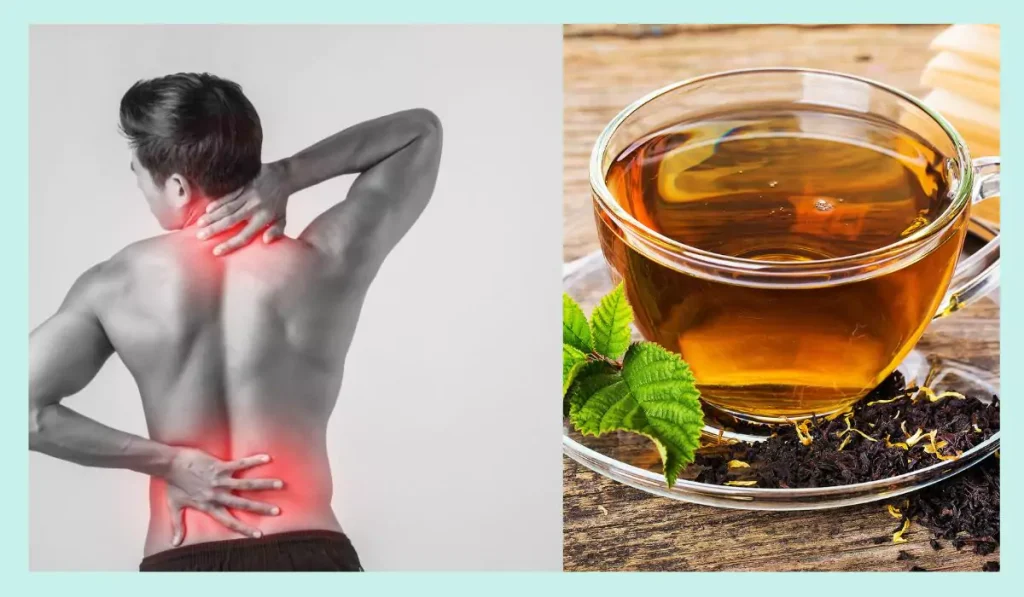Soothing Sips: Tea for Muscle Pain Relief
Soothe aching muscles naturally with the power of tea. Varieties like ginger, turmeric, green tea and tart cherry pack anti-inflammatory compounds that can alleviate soreness and promote recovery. Discover how incorporating tea for muscle pain into your routine may offer relief and support an active lifestyle.

Disclaimer: Our recommendations are sincere, driven by the products’ benefits. When you buy through our links, we may earn a commission, backing our testing and development at no extra cost to you.
Muscle pain and soreness can be incredibly debilitating, hindering our daily activities and overall well-being. While over-the-counter medications are commonly used for relief, many individuals are seeking natural alternatives like tea for muscle pain to alleviate discomfort. Tea, a humble yet powerful beverage, has been utilized for centuries in traditional medicine practices worldwide. This article will explore the potential benefits of drinking tea for muscle pain and highlight some of the most effective varieties.
Understanding Muscle Pain
What is Muscle Pain?

Muscle pain, also known as myalgia, can arise from various causes, including exercise, injury, or underlying medical conditions. It can range from mild discomfort to severe, debilitating pain. When muscles are overworked or strained, they release inflammatory compounds, leading to soreness and stiffness.
Causes of Muscle Pain
Exercise-induced muscle pain is one of the most common causes. During physical activity, muscles undergo micro-tears, leading to inflammation and subsequent soreness. Injuries, such as strains or sprains, can also result in muscle pain. Additionally, certain medical conditions like fibromyalgia or autoimmune disorders can cause chronic muscle pain. This is why people use tea for muscle pain relief
The Power of Tea
What Makes Tea Beneficial for Muscle Pain? Tea contains a wealth of natural compounds, such as antioxidants and anti-inflammatory agents, that may help alleviate muscle pain and promote recovery. Some teas have been specifically studied for their potential muscle-soothing properties as a natural tea for muscle pain remedy.
The History of Tea for Medicinal Use
Tea has been used for medicinal purposes for thousands of years in various cultures. Ancient Chinese and Indian traditional medicine practices recognized the therapeutic properties of different tea varieties and incorporated them into various remedies for various ailments, including muscle pain and inflammation.
Teas for Muscle Pain Relief
- Ginger Tea Ginger (Zingiber officinale) has long been revered for its anti-inflammatory and analgesic (pain-relieving) properties. The compound gingerol, found in ginger, can help reduce inflammation and alleviate muscle soreness. Drinking ginger tea after an intense workout or physical activity may help reduce muscle pain and promote faster recovery, making it an excellent tea for muscle pain.
- Turmeric Tea Turmeric, a vibrant golden spice, contains the potent compound curcumin, which has been extensively studied for its anti-inflammatory and antioxidant effects. Curcumin can help reduce inflammation in the muscles, potentially alleviating pain and promoting healing. Turmeric tea can be a flavorful and beneficial addition to your post-workout routine.
- Green tea is rich in antioxidants called catechins, particularly epigallocatechin gallate (EGCG). These compounds have been shown to possess anti-inflammatory properties that may help reduce muscle inflammation and soreness. Additionally, green tea contains small amounts of caffeine, which can enhance pain relief and improve focus during exercise.
- Tart Cherry Juice While not technically a tea, tart cherry juice has gained popularity for its potential muscle-soothing effects. Tart cherries are rich in anthocyanins, which are powerful antioxidants with anti-inflammatory properties. Studies have suggested that drinking tart cherry juice before and after exercise may help reduce muscle pain and promote faster recovery.
- Chamomile tea is renowned for its calming and soothing properties. While not directly targeting muscle pain, chamomile can help promote relaxation and reduce overall body tension, which may indirectly alleviate muscle discomfort. Additionally, chamomile possesses anti-inflammatory properties that may contribute to muscle recovery.
Potential Benefits of Tea for Muscle Pain
- Anti-Inflammatory Properties Teas rich in compounds like gingerol, curcumin, and catechins possess potent anti-inflammatory properties that can help reduce muscle inflammation and soreness, alleviating pain and promoting healing.
- Antioxidant Support Many teas are packed with antioxidants that can help neutralize free radicals and reduce oxidative stress, which can contribute to muscle damage and inflammation.
These potential benefits are a factor that people consider before using tea for muscle pain relief.
How to Incorporate Tea for Muscle Pain
- Post-Workout Beverage: Sipping on a warm cup of ginger, turmeric, or green tea after an intense workout can help soothe muscle soreness and promote recovery, serving as an effective tea for muscle pain.
- Tea Infusions: Steeping herbs like ginger, turmeric, or chamomile in hot water and adding a splash of tart cherry juice can create a muscle-soothing infusion as a natural tea for muscle pain.
- Iced Tea: During warmer months or after an outdoor workout, chilled teas like green tea or tart cherry juice can provide a refreshing and muscle-soothing beverage.
- Topical Application: Some teas, like chamomile, can be brewed into a strong concentrate and applied topically to sore muscles as a compress or added to a warm bath for relief.
Complementary Lifestyle Practices While tea for muscle pain can be beneficial, incorporating other healthy habits can enhance its effects and support overall muscle recovery.
- Hydration: Staying well-hydrated before, during, and after exercise can help prevent muscle cramps and soreness.
- Proper Warm-Up and Cool-Down: Stretching and gradually increasing intensity before exercise can help prevent muscle strain and injury.
- Rest and Recovery: Allowing adequate rest and recovery time between intense workouts can help prevent overuse injuries and muscle fatigue.
- Balanced Diet: Consuming a diet rich in anti-inflammatory foods like fruits, vegetables, and healthy fats can support muscle recovery and reduce inflammation.
Lifestyle Factors and Precautions
- Consult a Healthcare Professional: If muscle pain persists or worsens, it’s crucial to consult with a healthcare professional to rule out any underlying medical conditions.
- Medication Interactions: Some teas, like green tea, contain caffeine, which may interact with certain medications. Consult your doctor if you are taking any prescription drugs.
- Allergies: Be mindful of potential allergies to specific tea varieties or ingredients like ginger or turmeric.
Just like taking care of our muscles, we should also focus on our ear health. The ear is one of our sensory organs and its important to take good care of it. Products like Zencortex help in relieving ear pain and make it healthy.
Related: Could An Ear Infection Cause Neck Pain? Find The Truth!
Conclusion
Tea for muscle pain can be a natural and effective way to alleviate discomfort and promote recovery. Varieties like ginger, turmeric, green tea, tart cherry juice, and chamomile offer a wealth of anti-inflammatory and antioxidant compounds that may help soothe sore muscles. By incorporating these teas for muscle pain into your post-workout routine and maintaining a balanced lifestyle, you can harness the power of nature’s remedies to support your active lifestyle and enhance your overall well-being. However, it’s essential to consult with a healthcare professional if muscle pain persists or worsens and to be mindful of potential interactions or allergies.
Lindsay Martinez
Lindsay Martinez, Au.D., is a licensed audiologist with over 10 years of experience in the field of hearing healthcare. She earned her Doctor of Audiology degree from the University of California, Los Angeles, and currently practices at Martinez Hearing Clinic, a leading audiology practice in the San Francisco Bay Area. As an expert in diagnosing and treating a wide range of hearing disorders, Dr. Martinez specializes in fitting advanced hearing aids and assistive listening devices. She is a fellow of the American Academy of Audiology and has published numerous peer-reviewed articles on topics such as noise-induced hearing loss and the latest innovations in hearing technology. Passionate about patient education, Dr. Martinez is committed to helping her patients improve their hearing and overall quality of life.
